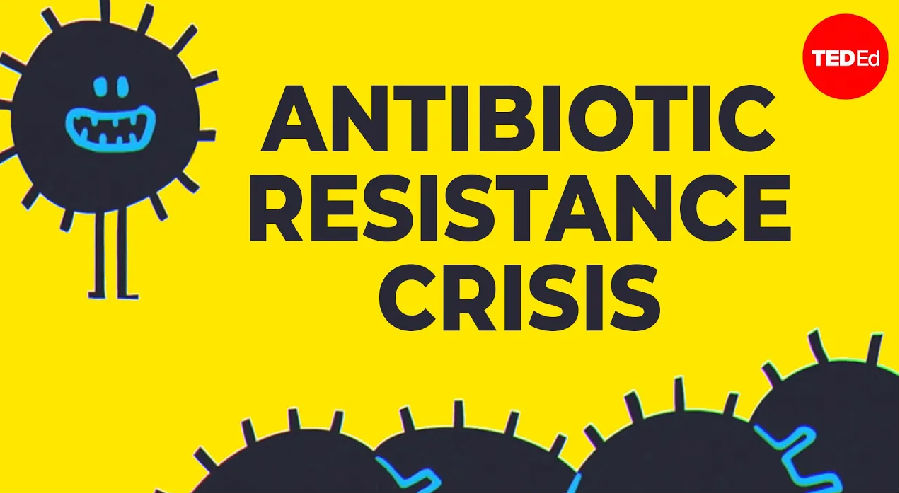Antibiotics: behind the scenes, they enable much of modern medicine.
抗生素:现代医学的幕后英雄。
We use them to cure infectious diseases, but also to safely facilitate everything from surgery to chemotherapy to organ transplants.
我们不仅用它们治疗感染性疾病,还用它们保障医疗安全--从外科手术到化疗,再到器官移植。
Without antibiotics, even routine medical procedures can lead to life-threatening infections.
若没有抗生素,常规的医疗程序也会引起致命的感染。
And we're at risk of losing them. Antibiotics are chemicals that prevent the growth of bacteria.
而人类正面临着失去它们的风险。抗生素是一些能抑制细菌生长的化学物质。
Unfortunately, some bacteria have become resistant to all currently available antibiotics.
不幸的是,一些细菌已经对当下所有的抗生素产生了抗药性。
At the same time, we've stopped discovering new ones. Still, there's hope that we can get ahead of the problem.
与此同时,我们又停止了对新型抗生素的研发。尽管如此,人类仍有望克服这一困境。
But first, how did we get into this situation?
但首先,我们是如何陷入这一困境的?
The first widely used antibiotic was penicillin, discovered in 1928 by Alexander Fleming.
青霉素是第一种被广泛使用的抗生素,它于1928年被亚历山大·弗莱明发现。
In his 1945 Nobel Prize acceptance speech, Fleming warned that bacterial resistance had the potential to ruin the miracle of antibiotics.
在他1945年诺贝尔奖的获奖感言里,弗莱明警告了世人细菌的抗药性可能摧毁抗生素创造的奇迹。
He was right: in the 1940s and 50s, resistant bacteria already began to appear.
他说得没错:20世纪中叶,抗药性细菌已经开始产生。
From then until the 1980s, pharmaceutical companies countered the problem of resistance by discovering many new antibiotics.
到了20世纪80年代,制药企业通过研发新的抗生素解决了抗药性问题。
At first this was a highly successful -- and highly profitable -- enterprise. Over time, a couple things changed.
一开始,这是一项非常成功--也非常赚钱--的生意。渐渐地,事情发生了变化。
Newly discovered antibiotics were often only effective for a narrow spectrum of infections, whereas the first ones had been broadly applicable.
新研发出的抗生素通常只对少数几类感染有用,相比之下,第一代抗生素的适用范围非常广。
This isn't a problem in itself, but it does mean that fewer doses of these drugs could be sold -- making them less profitable.
这本身不是问题,但它确实意味着每种药物的销量会下降--利润也随之缩水。
In the early days, antibiotics were heavily overprescribed, including for viral infections they had no effect on.
早期,抗生素处方严重过量,甚至被用在毫无疗效的病毒感染上。
Scrutiny around prescriptions increased, which is good, but also lowered sales.
对于处方的审查力度加大是件好事,但也导致了销量进一步下滑。
At the same time, companies began to develop more drugs that are taken over a patient's lifetime,
同时,公司开始研发更多患者需要长期服用的药物,
like blood pressure and cholesterol medications, and later anti-depressants and anti-anxiety medications.
例如血压和胆固醇药物,之后是抗抑郁药物和抗焦虑药物。
Because they are taken indefinitely, these drugs more profitable.
由于患者需要一直服用,生产这些药的利润更大。
By the mid-1980s, no new chemical classes of antibiotics were discovered.
截止到1980年代中期,已经没有新的抗生素化学类别被发现。
But bacteria continued to acquire resistance and pass it along by sharing genetic information between individual bacteria and even across species.
但细菌的抗药性与日俱增,基因信息也开始在细菌个体甚至跨种类的细菌之间传播。

Now bacteria that are resistant to many antibiotics are common, and increasingly some strains are resistant to all our current drugs.
今天,一种细菌对多种抗生素产生抗药性很常见,而且越来越多的菌株对所有药物都产生了抗药性。
So, what can we do about this?
那么,我们能做些什么呢?
We need to control the use of existing antibiotics, create new ones, combat resistance to new and existing drugs, and find new ways to fight bacterial infections.
我们需要控制现有抗生素的使用,研发新的抗生素,抑制对新老抗生素的抗药性,并探究治疗细菌感染的新办法。
The largest consumer of antibiotics is agriculture, which uses antibiotics not only to treat infections but to promote the growth of food animals.
抗生素的最大消费领域是农业,人们不仅用抗生素治疗感染,还用它来促进家畜生长。
Using large volumes of antibiotics increases the bacteria's exposure to the antibiotics and therefore their opportunity to develop resistance.
大量使用抗生素增加了细菌和抗生素的接触,从而增加了产生抗药性的可能。
Many bacteria that are common in animals, like salmonella, can also infect humans,
一些在动物体内常见的细菌,如沙门氏菌,也能感染人类,
and drug-resistant versions can pass to us through the food chain and spread through international trade and travel networks.
有抗药性的变种也能通过食物链传给我们,并通过国际贸易和旅游网络传播。
In terms of finding new antibiotics, nature offers the most promising new compounds.
说到研发新抗生素,大自然贡献了最具前景的新化合物。
Organisms like other microbes and fungi have evolved over millions of years to live in competitive environments
像细菌、真菌这样的微生物已经进化了数百万年才在残酷的自然界中生存下来,
meaning they often contain antibiotic compounds to give them a survival advantage over certain bacteria.
意味着其体内通常含有抗生素化合物,使其对某种特定细菌更具生存优势。
We can also package antibiotics with molecules that inhibit resistance.
我们也能用抑制抗药性的分子包裹抗生素。
One way bacteria develop resistance is through proteins of their own that degrade the drug.
细菌产生抗药性的方式之一是用自身蛋白降解药物。
By packaging the antibiotic with molecules that block the degraders, the antibiotic can do its job.
将抗生素包裹在抑制降解物质的分子中,抗生素就能发挥作用。
Phages, viruses that attack bacteria but don't affect humans, are one promising new avenue to combat bacterial infections.
噬菌体,一种能攻击细菌但不感染人体的病毒,是一个很有前景的对抗细菌感染的新途径。
Developing vaccines for common infections, meanwhile, can help prevent disease in the first place.
同时,研发针对常见感染的疫苗,能在第一时间防御疾病。
The biggest challenge to all these approaches is funding, which is woefully inadequate across the globe.
以上所有手段面临的最大挑战是资金,全世界都面临着资金严重短缺的问题。
Antibiotics are so unprofitable that many large pharmaceutical companies have stopped trying to develop them.
抗生素的利润太低,以至于很多大型制药公司都停止了研发。
Meanwhile, smaller companies that successfully bring new antibiotics to market often still go bankrupt, like the American start up Achaogen.
其间,成功推出过新抗生素的小公司往往还是会破产倒闭,比如美国创业公司Achaogen。
New therapeutic techniques like phages and vaccines face the same fundamental problem as traditional antibiotics:
像噬菌体和疫苗这样的新治疗技术面临着和传统抗生素一样的困境:
if they're working well, they're used just once, which makes it difficult to make money.
如果它们有效,那么使用一次就够了,制药公司因此难以盈利。
And to successfully counteract resistance in the long term, we'll need to use new antibiotics sparingly -- lowering the profits for their creators even further.
而且,为了避免以后产生抗药性,人们需要更慎重地使用新抗生素--这又进一步降低了生产者的利润。
One possible solution is to shift profits away from the volume of antibiotics sold.
一个可能的对策是拆解利润和销量之间的关系。
For example, the United Kingdom is testing a model where healthcare providers purchase antibiotic subscriptions.
例如,英国正在测试一种新模式,推动医疗机构定期购买抗生素。
While governments are looking for ways to incentivize antibiotic development, these programs are still in the early stages.
尽管政府正在千方百计地鼓励研发抗生素,这些计划仍在初级阶段。
Countries around the world will need to do much more
世界各国的努力还远远不够,
but with enough investment in antibiotic development and controlled use of our current drugs, we can still get ahead of resistance.
但是,若能为抗生素研发投入足够的资金,并管控现有药物的使用,我们仍然有望战胜细菌的抗药性。


